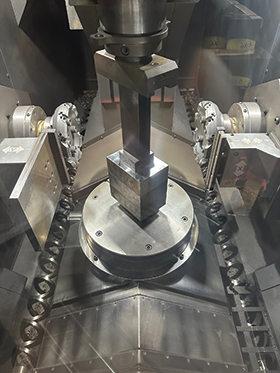

In today’s competitive market, manufacturers of hydraulic components are constantly challenged to find better, faster and cheaper ways of producing parts. One solution is to convert from carbon steel to continuous cast ductile iron as the base material. Axiom Hydraulics has met the challenge, and can now deliver a product with superior performance and significant cost savings for its customers.
As the official distributor in South Africa of continuous cast iron bar from top materials manufacturer, Dura-Bar, Axiom supplies the raw product and also machines it into finished components. Director, Eugene Tondolo says: “We can offer a comprehensive range of continuous cast iron bar stock in several grades of ductile iron and grey iron. Profiles range from rounds to squares, rectangles and tubes.”
To top this off, Axiom also recently invested in a double-head milling machine to avoid the problems typically associated with material preparation and provide an added value service for customers wanting squared to size material.
Dura-Bar is a world leader in the production of continuous cast iron bar. The company’s unique process creates the iron bar stock in a horizontal continuous casting process without using any sand, and also includes graphite in the mix. The consistent fine-grained microstructure is a result of the bar being pulled from the bottom of the holding crucible, causing dross, slag and other impurities to float to the top, away from the opening of the die.
This results in many physical and structural advantages over steel, castings and aluminium. The microstructure is free from shrinkage, gas holes, sand and other tool-wearing inclusions, and is backed up by Dura-Bar’s zero-defect guarantee, which has no equal in the industry. This boosts throughput and lowers the cost per part. It also gives better surface finishes. Dura-Bar’s enhanced noise and vibration damping, thermal conductivity, and wear resistance are due to the graphite, which cushions vibrations. This provides the same benefits as lead, without creating the machining and waste disposal problems. It acts as a chip-breaker, dissipating heat and reducing tool-wearing friction between the workpiece and the insert.
Apart from being lighter, Dura-Bar’s superior machinability increases machining speeds by up to 50%. Increased feed rates are a result of a reduction on spindle load and less cutting force required, compared to steel. Improved tool life results from consistent material structure and graphite content. It is also easier to achieve and maintain surface finishes due to the nodular graphite structure.
There is a wealth of information on the Dura-Bar website, where you can find detailed information on the material, together with numerous case studies highlighting the benefits. By switching to Dura-Bar it is possible to reduce total parts cost by up to 40%, increase machine capacity by up to 40%, and extend tool life by two to three times that of steel and other iron products. Dura-Bar’s machining advantages boost productivity by 30% on average through improved machine utilisation, by machining more parts per hour, and by decreasing cycle time. Parts run quieter, and tool life is increased. The bottom line is that machine shops, OEMs and repair facilities switch to Dura-Bar to save money through increased productivity.
The more machining a part requires, the more opportunity there is for significant cost savings with Dura-Bar. Among the huge number of applications in the fluid power industry are gears, cylinder blocks, manifolds, end caps, gear rack housings, pump and compressor components, glands, manifolds, pistons, rotors and valves; and in the power transmission industry coupling hubs, pulleys and sprockets.
Tondolo explains how inefficient and wasteful the crucial step of material preparation can be in a machining or fabrication shop, and how it can occupy expensive equipment that should be used for advanced functions. It’s a huge challenge to productivity in your machine shop when you first have to prepare material on your expensive CNC machine before you can start machining.
Axiom’s investment in a double-head milling machine means that material can arrive at the customer’s door as machine-ready blanks, and can be machined as soon as it is received. The milling machine is used to square internal material for manufacture, and for hydraulic manifolds.
One facet of Axiom’s business is the design and manufacture of manifolds for the hydraulics market. In the company’s integrated manifold design centre, its engineers design intricate, integrated manifolds to suit any system requirement, using schematical circuitry and the latest design software. This is backed up by five three-axis CNC milling machines, and now also the new double-head CNC milling machine with Sun Hydraulics precision tooling.
Tondolo concludes that this investment has been invaluable for Axiom. It has increased output and quality of production, and has bsignificantly reduced job throughput times, increasing productivity three-fold.
| Tel: | +27 11 334 3068 |
| Email: | [email protected] |
| www: | www.axiomsa.co.za |
| Articles: | More information and articles about Axiom Hydraulics |

© Technews Publishing (Pty) Ltd | All Rights Reserved